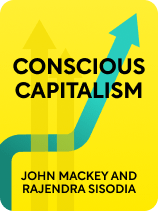

This article is an excerpt from the Shortform book guide to "Conscious Capitalism" by John Mackey and Rajendra Sisodia. Shortform has the world's best summaries and analyses of books you should be reading.
Like this article? Sign up for a free trial here.
What are common capitalism myths? Is free-market capitalism good for society?
According to Conscious Capitalism by John Mackey and Rajendra Sisodia, free-market capitalism is the ideal economic system. However, there are some misconceptions about capitalism.
Continue reading for a deeper dive into these capitalism myths.
Myths About Capitalism
The authors believe it’s had a more positive influence on humanity than any other human invention because it enables entrepreneurs to come up with innovative solutions to the world’s problems. Thus, the authors attribute gains in quality of life over the last 200 years—including technology advances, greater global connectivity, and improved human health, literacy, and democratic equality—to free-market capitalism. They also explain that free-market capitalism has proven itself to be better than socialist alternatives, as evidenced by socialism’s inability to gain and keep a foothold anywhere in the world. (Shortform note: Five countries currently claim to socialist.)
However, the authors recognize that capitalism has come under scrutiny in recent years—and they argue that it’s because while capitalism is theoretically sound, businesspeople have understood and implemented it poorly. They explain that people commonly hold three mistaken capitalism myths about the system’s utility:
First, people mistakenly believe that capitalism worsens inequality because businesspeople can sometimes be cutthroat and self-serving, which widens the gap between the rich and the poor. The authors argue that according to the theoretical basis of capitalism, this shouldn’t happen: Adam Smith (an economist who was one of capitalism’s founding fathers) argued that an inherent purpose of doing business is to help one another and improve the world.
Second, people mistakenly believe that capitalism inevitably causes social and environmental problems because many businesses prioritize profits at the expense of the public and the environment. The authors explain that according to the theoretical basis of capitalism, businesspeople shouldn’t prioritize profits—they should be inspired by their passion for improving the world and pursue profits only because doing so enables them to solve social and environmental problems.
Third, people mistakenly believe that capitalism is unfair because it leads to cronyism—the use of government connections to gain more than their fair share of profits and undermine the free market. According to the authors, the theoretical basis of capitalism is inherently fair, voluntary, and democratic—everyone has a chance to succeed.
| A Brief Primer on Economic Systems Free-market capitalism is a competitive economic system based on the relationship between supply and demand—where increased demand for a product increases product prices. Suppliers respond by producing more of the product, which levels out prices and ensures that only the most competitive suppliers make sales (and therefore profits). Since supply and demand regulate market operation under capitalism, the system allows for minimal government intervention. Socialism is typically considered capitalism’s polar opposite. Under socialism, the government determines how much of a product will be made and at what price it will be sold. Instead of relying on supply and demand, which are forces of self-interest—consumers want what they want, and producers want to make profits, so they fulfill consumers’ desires—socialist economies emphasize meeting the collective, basic needs of society and enable the government to anticipate and strategically fulfill these needs. Some economists say that most countries don’t practice pure capitalism or pure socialism—instead, they practice cronyism, where business success depends on government favoritism rather than supply and demand. Experts explain that capitalists and socialists blame each other for cronyism’s global popularity—capitalists believe cronyism happens because governments want to exert too much control over markets, while socialists believe cronyism happens because capitalism incentivizes both governments and businesses to pursue profits, no matter the social cost. Now that we have a definition of the relevant economic systems, let’s address the authors’ arguments. Mackey and Sisodia argue that critiques of capitalism are unfounded because they’re not actually critiques of capitalism—they’re critiques of the ways humans have misapplied capitalist principles. This may qualify as a “no true Scotsman” fallacy—a kind of illogical argument that entails changing the definition of a concept so that critiques of the concept can be said not to apply. By arguing that capitalism is theoretically sound but poorly implemented, the authors are essentially saying that none of the failures of economies that purport to be capitalist can be attributed to capitalism. However, economists broadly recognize the common criticisms of capitalism listed by the authors (that capitalism worsens inequality, causes social and environmental problems, and leads to cronyism) as downsides of practicing capitalism. Some experts believe that capitalism inevitably leads to these problems: For example, some experts observe that under capitalism, wealth naturally creates greater wealth, but it’s hard for the poor to accumulate the wealth necessary to begin that cycle—which ultimately leads to exacerbated financial, health-related, and social inequality. Some experts also believe that capitalism’s focus on continuous economic growth is at the root of the current global environmental crisis. On the other hand, other experts argue that capitalism has unique advantages compared to other economic systems. For example, some experts agree with the authors that capitalism is the reason for major quality of life advances over the last few centuries—since capitalism promotes competition, it forces entrepreneurs to create new things, which helps human progress. Some research also indicates that capitalism leads to better environmental outcomes than other economic systems. Proponents of capitalism argue that while capitalism may contribute to financial and social inequality, that’s OK because everyone has an equal opportunity to pursue wealth and status—if they don’t achieve it, it’s due to their own failure. |

———End of Preview———
Like what you just read? Read the rest of the world's best book summary and analysis of John Mackey and Rajendra Sisodia's "Conscious Capitalism" at Shortform.
Here's what you'll find in our full Conscious Capitalism summary:
- That capitalism is inherently good for people, but we're doing it wrong
- How conscious capitalism benefits both consumers and businesses
- How to meet the interests of all parties without sacrificing anyone's needs






